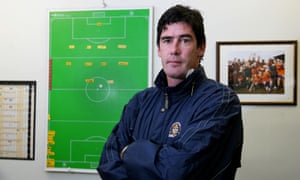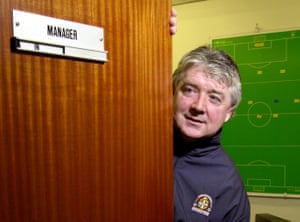The forgotten story of … Luton Town's Manager Idol
Primetime TV would prove the inspiration for one of the most shambolic managerial appointments in football history
 Mike Newell at Kenilworth Road in 2004. Photograph: Tom Jenkins for the Guardian
Mike Newell at Kenilworth Road in 2004. Photograph: Tom Jenkins for the Guardian
Back before X Factor, Strictly and Britain’s Got Talent dominated the Saturday night schedules, there was Pop Idol, the Simon-Cowell-backed singathon on which hundreds of plucky crooners belted their hearts out for the chance to win a record contract, while the public called in – in their droves – to vote for their favourites.
On 9 February 2002 more than 13 million people tuned in to see
Will Young take on Gareth Gates in the final of the first series – nearly nine million votes were cast. It was a huge ratings and financial success – even before the No 1 singles and multiplatinum albums, the series made £2.5m from the public’s newfound desire to have their say on the premium-rate phonelines.
The programme would prove the inspiration for one of the most shambolic (with the emphasis on sham) managerial appointments in football history. As the confetti fell on a celebrating Young, Luton and their manager, Joe Kinnear, were travelling back from a defeat at Rochdale. Kinnear had arrested a decade of decline at Kenilworth Road, picking up the reins as Luton were relegated to the bottom tier in 2001 (the first time the Hatters had been in the fourth tier since the 1960s). He steered the club to promotion back to the third tier at the first attempt and followed it up with a more-than-respectable ninth-place finish in 2002-03.
Luton, though, had been caught up in the fallout from
ITV Digital’s explosion the year before – there were reports of the club losing £500,000 a month. At the end of the season, owner Mike Watson-Challis sold the club to a mysterious consortium for just £4. The consortium remained anonymous but a smarmy, smiling front man arrived at Kenilworth Road – John Gurney.
Gurney claimed to be backed by international investors whose identity would soon be revealed (spoiler alert: they never were). In the meantime he set about sowing chaos and
floating a series of madcap ideas. He planned to change the club’s name to London Luton FC, to match the local airport. He suggested a merger with the Milton Keynes-bound Wimbledon was not out of the question. He would build a 70,000-seater stadium next to Junction 10 of the M1. On stilts. With a Formula One circuit attached.
But in the short term, he needed a new manager. The vacancy had arisen when, three days into the new ownership regime, the hugely popular
Kinnear and his assistant Mick Harford were fired. By post. Kinnear had to go to the sorting office to collect his letter as it was sent recorded delivery. “I think it is the saddest day in the club’s history,” Harford, a bona fide Luton legend, said. “What have I done to warrant being dismissed in such a cold and callous manner? My heart and soul was always with Luton Town and I’m devastated.”
The original plan had been to appoint former England defender Terry Fenwick (most recent managerial spell: a seven-game winless tenure with Northampton) but fan fury at the sackings prompted a rethink. Roger Terrell and Lee Power, set to take the roles of chairman and vice-chairman, quit before they started after being greeted at Kenilworth Road by a hail of fruit flung by irate supporters.
 Joe Kinnear during his time as manager in 2001. Photograph: Tom Jenkins for the Guardian
Joe Kinnear during his time as manager in 2001. Photograph: Tom Jenkins for the Guardian
With supporters boycotting the club, Gurney needed to get the fans onside. An attempt to renegotiate with Kinnear and Harford foundered. Then came the brainwave: Manager Idol. “We’ve got to find an acceptable way of having an appointment made, without being seen to give way to the mob,” said Gurney. “So we’ve come up with the idea of Manager Idol based on Pop Idol.”
Fans were presented with a shortlist of candidates – Fenwick, Kinnear, Nigel Clough, Steve Cotterill, Mike Newell, Stuart Pearce, Gardner Speirs and Gudjon Thordarson – and invited to text in their votes. On Monday 16 June the first set of results were announced and the list whittled down to three: Kinnear (who polled around 70% of the votes), Cotterill, recently sacked by Sunderland, and Newell, who had most recently had a mixed time of it with Hartlepool.
The final decision would be split between five votes: players, shareholders, season-ticket holders, the board and the general public. The premium lines – 50p per call – were opened. They closed at midday on Monday 23 June. A press conference for the unveiling was scheduled at 1pm … the same day. In the meantime, Gurney set about attempting to agree terms with the shortlisted trio.
It was all predictably chaotic. Gurney initially revealed he had
agreed terms with Kinnear to return should he win, then admitted he’d been unable to contact the former manager all week. No matter. “We’ve two excellent candidates in Steve and Mike Newell,” Gurney cheered. But the day before the polls closed, Cotterill threw a spanner in the works. “I had a very good meeting with Mr Gurney,” he said, “and I was very flattered to be offered the job from 70 candidates, but I just think it was the right club at the wrong time.”
Handily, filmmakers from the long-running BBC documentary series Trouble At The Top were given behind-the-scenes access for the big day. The resulting half-hour programme, aired a year later,
really has to be seen to be believed.
With media already gathering at the ground, a fresh-faced pre- “
I know that sounds sexist but I am sexist” Newell arrived at Kenilworth Road. There was no sign of Cotterill or Kinnear, who with the seconds ticking down towards midday still led the public phone poll. “There’s all sorts of chaos,” said Gurney, suggesting there has been some sort of technical issue. Then came an unbelievable – in a very literal sense – late swing towards Newell in the general public vote. He, conveniently, won it by just four votes.
Players and season-ticket holders had apparently voted for Kinnear, shareholders and the general public (thanks to that late swing) for Newell. So it was down to the board. “We will appoint Mike Newell regardless of the telephone poll,” Gurney told the documentary team. “For two reasons: one is we failed to agree terms with Joe Kinnear, Steve Cotterill is not here and Mike is. And we said whoever was available and we agreed terms with by 1pm today would be the new manager, so Mike is the new manager.”
Clear as mud. Newell looks thoroughly bemused throughout the documentary but had a largely successful spell at the club, guiding the Hatters to promotion in 2004-05 and 10th in the Championship the following season (a position that remains their highest since 1992).
And Gurney? At the end of July the club’s supporters trust – having denied Gurney revenue with a boycott of season tickets – ingeniously bought the club’s debt from Watson-Challis and placed it into administration,
forcing Gurney out. “If they expect me to walk away from Luton with nothing, I’ll make very sure there’s nothing to walk away from,” growled Gurney . After a few – to put it mildly – ups and downs, Luton are chasing promotion in League One. Gurney was declared bankrupt in 2008.
https://www.theguardian.com/football/2018/oct/12/the-forgotten-story-of-luton-town-manager-idol


